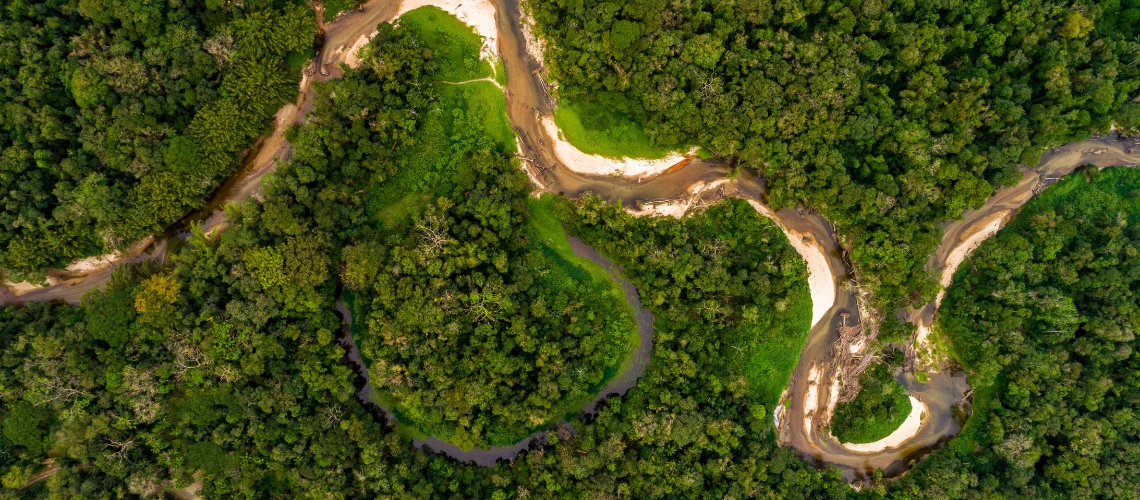 Aerial View of Amazon Rainforest. Photo: gustavofrazao from Getty Images
Aerial View of Amazon Rainforest. Photo: gustavofrazao from Getty Images
Every year, criminals make millions of dollars by illegally harvesting and trafficking our planet’s natural resources. Their crimes cover a wide range of activities, from illegal logging, to poaching and trafficking of endangered species, illegal mining, and waste trafficking.
While the environmental crimes themselves often occur in developing and resource-rich countries, criminals tend to move and launder their profits globally. They often rely on a mix of front companies and corrupt actors to move criminal profits undetected. The Financial Action Task Force (FATF) – the global anti-money laundering watchdog— estimates that environmental crime is one of the most profitable criminal enterprises, generating around USD 110 to 281 billion in criminal gains each year; however, its latest figures suggest that less than 1 percent of the profits are recovered. This should worry us all.
A Matter of Survival
Environmental crimes have huge human costs; indeed, the survival of our planet could depend on how effectively we can tackle the threat. Yet, till now, these types of crimes have been given lesser importance than other financial crimes, such as tax crimes or fraud. We spend millions of dollars each year on solutions for climate change, but most countries spend next to nothing on following and recovering proceeds from climate-related crimes. This is important as following the money often helps identify and bring down the wider networks and kingpins behind these crimes.
In recent years, there has been increased attention on the global need to follow the money from environmental crimes. In 2020 and 2021, the German and Chinese Presidencies to the FATF prioritized this issue and developed two public reports for countries on how to detect and investigate laundering of money from environmental crimes. While this was an important step, the topic has since fallen out of the policy spotlight. The real challenge now is how to get countries to regain and maintain this momentum and translate it into action on the ground.
What Needs to be Done
For this to happen, there needs to be a coordinated effort from governments, the FATF, and the public itself.
First, countries need to bring financial crime and anti-money laundering expertise into public-policy dialogue on environmental protection and climate change. In most countries, there has been very little coordination between agencies responsible for money-laundering prevention and those responsible for environmental protection. This needs to change as law enforcement needs environmental expertise to effectively prosecute money-laundering cases, and environmentalists need anti-money laundering (AML) tools to help reduce environmental destruction.
Second, case studies show that criminals involved in environmental crimes often launder their profits in plain sight, using legal markets to mix legal and criminal proceeds. They misuse the same AML weaknesses as fraudsters or tax criminals, who rely on gaps in information on ultimate owners behind companies and weak international cooperation. This highlights the need for both developed and developing countries to address long-standing gaps in their AML frameworks and ensure that AML experts partner with a wider range of public and private sector partners to detect anomalies.
Third, the FATF can play a big role in maintaining policy momentum on this topic. This includes ensuring that the next round of country evaluations of anti-money laundering controls—which starts in 2025—pays sufficient attention to environmental crimes. This will hopefully lead to all countries at least taking steps to understand their risk exposures and ensure their domestic agencies are collaborating with each other.
The World Bank’s Efforts
The World Bank Group (WBG) is working with countries to increase their capacity to tackle illicit financial flows from environmental crimes. Since 2017, we have worked with countries to assist them to better understand their money-laundering risks. This work includes WBGs environmental crimes risk module, which supports countries to assess money-laundering risks related to environmental crimes and to identify risk-mitigating measures to reduce related illicit financial flows. The tool has been rolled out in multiple countries with support from the Global Environment Facility and the Department for Environment, Food & Rural Affairs of the United Kingdom (DEFRA), as part of the World Bank-led Global Wildlife Program and the International Consortium on Combating Wildlife Crime. Through the WBG’s Stolen Asset Recovery Initiative, we’re also working in partnership with the United Nations Office on Drugs and Crime to help countries recover assets from corruption, a key enabler of environmental crimes.
We can make a difference when we work together. The time for action is now.
Enjoy this blog? Check out, We can't have a livable planet without a healthy wildlife population. by Valerie Hickey, Global Director for Environment, Natural Resources and Blue Economy.



Join the Conversation